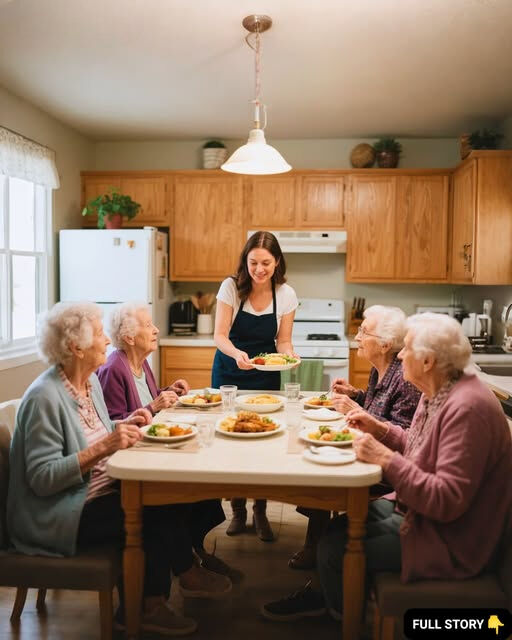Cassandra had always lived quietly in the family home she inherited, nestled in a peaceful, aging neighborhood. Next door lived four elderly sisters—Marie, Hazel, June, and Ruth—strong-willed, sharp, and independent. Over time, it became clear they needed help.
After long shifts at the hospital, Cassandra made it a habit to stop by—carrying groceries, fixing small things, or simply sharing tea. What began as small acts grew into a deep bond. The sisters adored her.
“You’re a blessing, Cassandra,” Marie once said, smiling warmly. “Let us pay you something.”
But Cassandra always declined. “I’m not doing this for money,” she said. “I care about you. That’s enough.”
Despite financial challenges, she showed up because she genuinely cared.
Years passed, and the sisters gradually passed away. After the last funeral, Cassandra received a call from a lawyer named Abigail, asking her to come to the office.
At the same time, the sisters’ children—distant and scattered—appeared, demanding to know about the will. Before they could gather, Abigail sent letters to each of them.
Each letter read:
“My dear child, this choice comes from love. You have your family and home. But the woman next door—who cared for us when no one else did—she deserves more than thanks. She deserves this home. May you find peace in this.”
When Cassandra arrived at the lawyer’s office, rain soaking her shoes and still in her hospital scrubs, she sat nervously.
“The house?” she asked quietly.
Abigail smiled kindly. “Yes. The sisters made it clear—long before their passing—that you should have it. Your kindness, consistency, and heart made this decision easy.”
“But they had children… grandchildren,” Cassandra whispered.
“They have their lives,” Abigail replied. “But you were there every day. You asked for nothing in return. They noticed, Cassandra. They wanted to give back.”
Cassandra’s voice broke. “They already gave me so much. Every visit felt like family.”
News of the inheritance spread fast. At first, the sisters’ children were angry. Elise, one daughter, came to Cassandra’s door, eyes red with frustration.
“You manipulated them,” she accused. “You waited for them to die, knowing about their money!”
Hurt, Cassandra explained, “That’s not true. I didn’t know they planned this.”
But Raymond, the youngest son, defended her.
“I hadn’t seen my mom in months—just sent flowers. Meanwhile, Cassandra was there helping, cooking, supporting. If anyone deserves that house, it’s her.”
Slowly, the anger faded. The letters were real. The sisters chose care over blood.
A month later, Cassandra moved into the home. It still carried the faint scent of rosewater and lemon balm. She kept their furniture, their favorite blankets, even Hazel’s worn armchair by the window.
She transformed the back guest room into a peaceful retreat—a space for rest and healing, with a cozy chair, medical books, a tea kettle, and a small sign: “The Sisters’ Corner.”
She began inviting local caregivers—nurses, aides, daughters caring for elderly parents—for weekend wellness gatherings. Free tea, shared stories, and a place to breathe.
Neighbors helped in unexpected ways: a carpenter repaired the porch, a florist brought fresh flowers, someone donated antique teacups. Cassandra never asked. Kindness, it seemed, was contagious.
One rainy afternoon, sitting in Hazel’s chair with tea in hand, Cassandra felt something deeper than luck or wealth.
She felt trusted.
And that meant everything.
Because Marie once told her something she’d never forget:
“Family isn’t just blood. It’s who shows up when no one else does.”
Cassandra didn’t just inherit a house—she inherited a legacy of love. And now, she passes it on, one cup of tea at a time.
